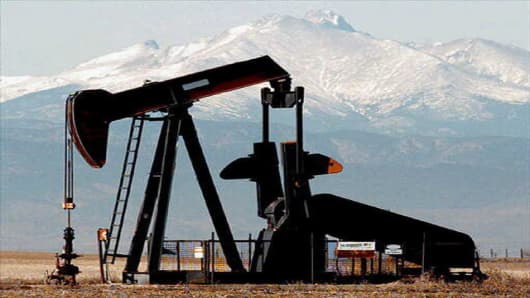Oil futures shot higher for the third straight day Monday, as concerns about potential supply disruptions overshadowed worries about the cooling economy.
Venezuelan President Hugo Chavez threatened Sunday to cut off oil sales to the U.S., as retaliation for court orders freezing assets belonging to Venezuela's state oil company.
Exxon Mobil has gone after Petroleos de Venezuela SA in U.S., British and Dutch courts, challenging the nationalization by Chavez's government of a multibillion dollar oil project. A British court last week issued an injunction freezing as much as $12 billion in Petroleos' assets.
"If you end up freezing (Venezuelan assets) and it harms us, we're going to harm you," Chavez said. "Do you know how? We aren't going to send oil to the United States."
Mike Fitzpatrick, vice president of energy and risk management at MF Global, said it was hard to weigh the comment.
"How much credence you want to give him is always a question mark," Fitzpatrick said.
But traders were clearly worried about the potential cutoff of Venezuelan oil. U.S. light, sweet crude for March delivery jumped $1.82 to settle at $93.59 a barrel on the New York Mercantile Exchange, after spiking to $94.72 earlier, a one-month high.
London Brent crude also rose.
Word of power outages at a Valero Energy refinery in Delaware City, Del., and a Citgo Petroleum refinery in Lake Charles, La., also helped push prices higher. Both plants were being restarted Monday, Dow Jones Newswires reported.
Traders were unnerved by new violence in Nigeria, Africa's largest oil producer and a major supplier to the U.S. On Monday, unidentified gunmen attacked a naval vessel that was escorting petroleum industry boats, killing one sailor and injuring another. Militant attacks have cut Nigeria's oil output by nearly one quarter in the past two years, helping send oil prices to all-time highs.
Concerns about supply disruptions overseas have temporarily drawn investors' focus away from the weakening U.S. economy, which had been the market's dominant theme. Worries that the economy is slowing, and demand for energy is falling, pushed oil prices down from a record above $100 a barrel in early January to nearly $86 in recent weeks.
Still, some analysts believe tight global supplies and efforts by Congress and the Federal Reserve to stimulate the economy will keep oil prices high for the foreseeable future.
In a note to clients, analysts at Goldman Sachs said the impact of a recession on oil demand growth "is likely to be meaningful," but not enough to keep Nymex crude from trading at $105 a barrel a year from now, Dow Jones reported.
At the pump, gasoline prices slipped 0.4 cent overnight to a national average of $2.953 a gallon, according to AAA and the Oil Price Information Service. Prices have mostly fallen lately, following oil's decline from its January record. But the Energy Department and many analysts expect prices to rebound in the spring and rise to new records near $3.50 a gallon.
Other energy futures also rose Monday. March heating oil futures rose 5.03 cents to settle at $2.6044 a gallon on the Nymex, and March gasoline futures rose 3.9 cents to settle at $2.3962 a gallon. March natural gas futures rose 23 cents to settle at $8.531 per 1,000 cubic feet.
Analysts said the current cold snap in the Northeast and Midwest was supporting heating oil and natural gas prices.
In London, Brent crude rose $1.59 to settle at $93.53 a barrel on the ICE Futures exchange.


